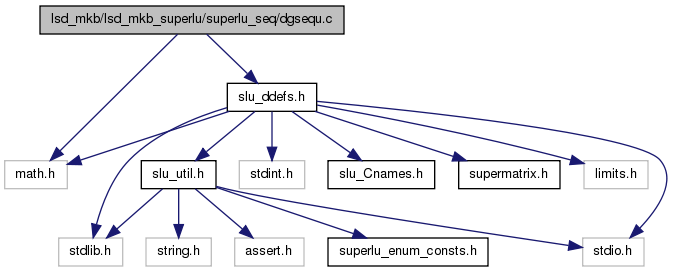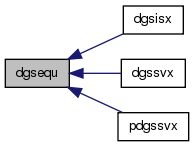Driver related.
Purpose
=======
DGSEQU computes row and column scalings intended to equilibrate an
M-by-N sparse matrix A and reduce its condition number. R returns the row
scale factors and C the column scale factors, chosen to try to make
the largest element in each row and column of the matrix B with
elements B(i,j)=R(i)*A(i,j)*C(j) have absolute value 1.
R(i) and C(j) are restricted to be between SMLNUM = smallest safe
number and BIGNUM = largest safe number. Use of these scaling
factors is not guaranteed to reduce the condition number of A but
works well in practice.
See supermatrix.h for the definition of 'SuperMatrix' structure.
Arguments
=========
A (input) SuperMatrix*
The matrix of dimension (A->nrow, A->ncol) whose equilibration
factors are to be computed. The type of A can be:
Stype = SLU_NC; Dtype = SLU_D; Mtype = SLU_GE. R (output) double*, size A->nrow
If INFO = 0 or INFO > M, R contains the row scale factors
for A. C (output) double*, size A->ncol
If INFO = 0, C contains the column scale factors for A. ROWCND (output) double*
If INFO = 0 or INFO > M, ROWCND contains the ratio of the
smallest R(i) to the largest R(i). If ROWCND >= 0.1 and
AMAX is neither too large nor too small, it is not worth
scaling by R. COLCND (output) double*
If INFO = 0, COLCND contains the ratio of the smallest
C(i) to the largest C(i). If COLCND >= 0.1, it is not
worth scaling by C. AMAX (output) double*
Absolute value of largest matrix element. If AMAX is very
close to overflow or very close to underflow, the matrix
should be scaled. INFO (output) int*
= 0: successful exit
< 0: if INFO = -i, the i-th argument had an illegal value
> 0: if INFO = i, and i is
<= A->nrow: the i-th row of A is exactly zero
> A->ncol: the (i-M)-th column of A is exactly zero =====================================================================



 1.6.1
1.6.1